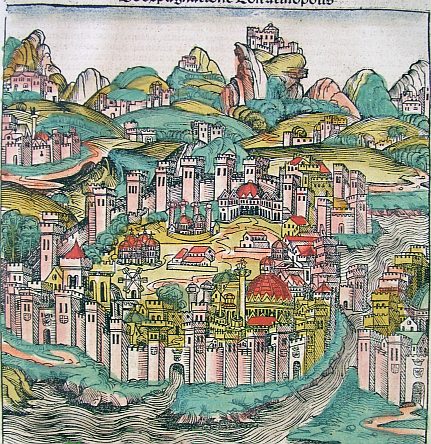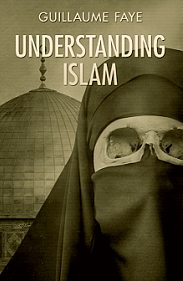Thomas Bertonneau’s latest essay is a review of a book that was published more than sixty years ago and is not available in digital form.
Mika Waltari’s Dark Angel (1952) — A Novel for Our Time
by Thomas F. Bertonneau
Introduction. The name of the Finnish novelist Mika Waltari (1908 — 1979) reached the peak of its currency in the mid-1950s when many of his titles had transcended the isolation of their original language to come into print in English, French, German, Italian, and Swedish. One of these, The Egyptian (1945) had reached the big screen in 1954 in a lavish Hollywood production directed by Michael Curtiz, with a cast that included Edmund Purdom, Victor Mature, and Jean Simmons. Curtiz’s film adhered closely to Waltari’s story, which concerns the attempted religious reforms of the pharaoh Akenaten, which Waltari, the son of a Lutheran minister and a serious student both of theology and philosophy, regarded as an early instance of ideology. Basing his fiction on the best information available at the time, Waltari strove to show how, despite the sincere intention of the reformer, the reforms themselves so contradicted Egyptian tradition that they devastated the society. The novel operates intellectually at a high level. So does Curtiz’s cinematic version, which likely explains its poor box-office on release. The Hollywood connection nevertheless boosted Waltari’s foreign-language sales and meant that his books would remain in print into the 1960s. Today Waltari’s authorship is largely forgotten, along with those of his Scandinavian contemporaries such as Lars Gyllensten, Martin A. Hansen, Pär Lagerkvist, Harry Martinson, Tarje Vesaas, and Sigrid Undset. Anyone who has seen the film Barabbas (1961) with Anthony Quinn in the title role has, however, had contact with Lagerkvist, on whose novel director Richard Fleischer drew.
All of those writers might justly be characterized as Christian Existentialists, heavily influenced by Søren Kierkegaard, who saw their century, the Twentieth, as an era of extreme crisis at its basis spiritual, and who saw the ideologies — the rampant political cults — of their day as heretical false creeds that fomented zealous conflict. It is unsurprising that such a conviction should have taken hold in Scandinavia. Two of the Scandinavian nations, Denmark and Norway, had endured conquest and occupation by Germany in World War II. Sweden avoided that fate, but as Undset wrote in her account of escaping the German invasion of Norway, most Swedes expected disaster to strike at any time from 1940 until the end of hostilities, either from the Germans or from the Russians — or possibly from both, with the nation becoming a battleground. In Finland, which had only won its independence in 1918, first by rejecting Russian rule and then by defeating a Communist insurrection within its own borders, the sense of acute crisis realized itself in the Soviet attack in the winter of 1939-40, during which Waltari worked in Helsinki in the Finnish Government’s Information Bureau, and again in the subsequent Continuation War of 1941 through 1944. These events are the immediate background to Waltari’s composition of The Egyptian, and they are by no means irrelevant to Dark Angel, published seven years later.
I. Dark Angel is somewhat less ambitious philosophically than The Egyptian, but it is perhaps more relevant to the present moment in 2017 than its precursor-novel in Waltari’s oeuvre, concerning as it does the Fall of Constantinople, and with it the remnant of Eastern Christendom, to Sultan Mehmed II’s Ottoman Turkish Jihad in the summer of the year 1453. In Waltari’s novel, incidentally, Mehmed is called Mohammed after the Arabic pattern of his Turkified name. In Dark Angel, as in The Egyptian, Waltari makes use of allegory. The shrunken, dispirited Greek-speaking Christian empire of the East, as it confronts the seemingly inexorable westward encroachment of militant Islam, stands in for the postwar West, as it confronts a militant, expansionist Communist empire stretching from Moscow to Peking and beyond. The enemy without — Islam or Communism — fosters enemies within: Fellow travelers who despise their nation and its ways and pessimists who have given up hope to await the end in moods of hedonism and cynicism. Nevertheless, neither Dark Angel nor The Egyptian can be reduced to allegory. Dark Angel in particular commemorates one of those epochal events in Western history, and particularly in the history of the West’s 1400-year hostile entanglement with militant Islam, that has vanished down the memory hole, and whose re-conjuration political correctness resists.
As in The Egyptian, again in Dark Angel, Waltari heightens the immediacy of his storytelling through the use of the grammatical first person and through the repletion of the background with carefully researched historical detail. The Egyptian presents itself as the memoir, written in old age, of the physician Sinuhe, whose profession brings him into contact with Akenaten, and who therefore witnesses the events of Akenaten’s regime from close at hand. Dark Angel purports to be the diary of the mysterious Jean-Ange, Giovanni Angelo, John Angelos, or Ioannis Angelos, an apparent soldier of fortune of Greek ancestry who shows up in Constantinople a few weeks before the onset of the fateful siege. Like Sinuhe in The Egyptian, Angelos corresponds to the typical protagonist of the mid-Twentieth Century Existentialist novel: He is the deracinated man, part cynic, part skeptic, who has felt the tug of a redemptory Tradition and has resolved to root himself again, to the extent possible, in what he can identify as his ancestral ilk. His actions are by way of paying off a belatedly recognized debt; and they seek to affirm a patrimony as well as a more general cultural and religious kinship. Angelos functions additionally as a living Rorschach image for other characters, who, recognizing him as somehow familiar and rather haunting, project on him their own otherwise hidden thoughts and traits. An angel is a messenger — and in the stranger’s presence people experience the compulsion to deliver up their own messages, as though in confession, whether they mean to or not.
In Angelos, Waltari has conjured a pure fiction, but he draws most of his characters from the historical annals. One might read John Runciman’s classic study of The Fall of Constantinople (1965) alongside Dark Angel and encounter the same tragic personae. In Waltari’s novel, for example, Emperor Constantine XI Palaeologus is a character; so too is the Megadux or Admiral of the Fleet Lukas Notaras, with his daughter, the beautiful Anna, and his two sons. The ex-Keeper-of-the-Seal George Scholarius, now referring to himself as the monk Gennadius, takes a role in the tangled plot. The Genoese strategist Giovanni Longo Giustiniani, who brings his mercenary army to participate in the city’s defense, befriends Angelos, who becomes his lieutenant. On the Muslim side Waltari gives his readers Sultan Mohammed, in whose retinue Angelos has previously served, such that both the Greeks and Latins of Constantinople plausibly mistrust him. A minor character on the Constantinopolitan side, the German engineer John Grant, represents an emergent scientific and technical worldview that sees itself as entirely extra-moral. Waltari knows the layout of the Fifteenth-Century imperial capitol the way he knows the back of his hand. Runciman’s Fall with its maps makes itself useful as a Baedeker to the novel. It helps to know where the Blachernae Palace stands in relation to the Romanos Gate and other topographical details.
Waltari, establishing an atmosphere of tenseness from the beginning, makes it clear that Western — that is to say, Catholic-Orthodox — doctrinal factionalism contributed mightily to making the Byzantine rump-empire vulnerable to Ottoman aggression, despite the city’s formidable walls. So too did the cowardice of key parties among the Greeks and the Latins. The Palaeologus dynasty had in fact seen the writing on the wall since the reign of Manuel II, Constantine’s father. During his emperorship, Manuel undertook a grand tour of Europe as far as the court of Henry IV of England seeking European support for Eastern Christendom. Manuel also sent an ecclesiastical delegation to Ferrara in Italy to negotiate with Rome concerning doctrinal differences; after a few months the so-called Council moved to Florence, but it was disorganized in both places. As Runciman writes, “the detailed story of the Council makes arid reading,” but the conclusion, pressed for by Manuel’s eldest son John (who would reign as John VIII) against his father’s wishes, was a declaration of union that the ordinary constituents of Orthodoxy regarded as a betrayal. Nevertheless, in the hope that it would facilitate direct aid from the Catholic West should a crisis come, Constantine, on succeeding John, publicly upheld the declaration and permitted the filioque of the Latin Mass to be uttered during the liturgy in Hagia Sophia.
Dark Angel begins just as one such liturgy ends. In the characteristic Byzantine manner, participants in the Mass leave the church in strict hierarchical order. Standing outside Hagia Sophia, Angelos sees Constantine and his retinue emerge. He remarks of Notaras that “his glance was keen and scornful, but in his features I read the melancholy common to all members of ancient Greek families.” Angelos knows Notaras to be an opponent of union. He supposes that the Megadux, although obliged to attend the service, was “agitated and wrathful, as if unable to endure the deadly shame that had fallen on his Church and his people.” As the palace guard brings forward the retinue’s horses, Angelos hears shouts from the crowd: “Down with unlawful interpolations” and “down with papal rule.” Breaking away from the emperor, Notaras addresses the crowd. “Better the Turkish turban,” he shouts, “than the Papal miter!” The crowd repeats the slogan. Angelos compares the sentiment to the one voiced by another crowd centuries before: “Release unto us Barabbas!” Later, the crowd shouts after Constantine, “Apostata, Apostata!” Angelos, who attended the discussions in Florence fourteen years earlier, senses the spreading dementia in the city and knows that it spells doom.
Continue reading →


 Mein Kampf is the notorious autobiography written in the 1920s by Adolf Hitler, in which the future Führer laid out his plans for a revived Reich and the expansion of the German Volk into new territories in the East.
Mein Kampf is the notorious autobiography written in the 1920s by Adolf Hitler, in which the future Führer laid out his plans for a revived Reich and the expansion of the German Volk into new territories in the East.

 But this response can only happen when free men and women first look around them at their children and their children’s children, contemplate what such a future may hold for them and theirs, and then, lastly, inwardly ask of themselves: “What am I doing? Why is this happening? Where have I gone wrong?” Thus, in the face of this observed reality, the whole rotten-to-the-core 21st-century global elite’s collective power grab may be peeled back layer by layer. Once full understanding and the fear induced by a realisation of impending tyranny or extinction have together overcome the false doctrines endlessly iterated by the deconstructionists, it is then, and only then, that mass counter-movements can arise, reset the course of their lives and determine their own destiny according to their needs and desires.
But this response can only happen when free men and women first look around them at their children and their children’s children, contemplate what such a future may hold for them and theirs, and then, lastly, inwardly ask of themselves: “What am I doing? Why is this happening? Where have I gone wrong?” Thus, in the face of this observed reality, the whole rotten-to-the-core 21st-century global elite’s collective power grab may be peeled back layer by layer. Once full understanding and the fear induced by a realisation of impending tyranny or extinction have together overcome the false doctrines endlessly iterated by the deconstructionists, it is then, and only then, that mass counter-movements can arise, reset the course of their lives and determine their own destiny according to their needs and desires.







